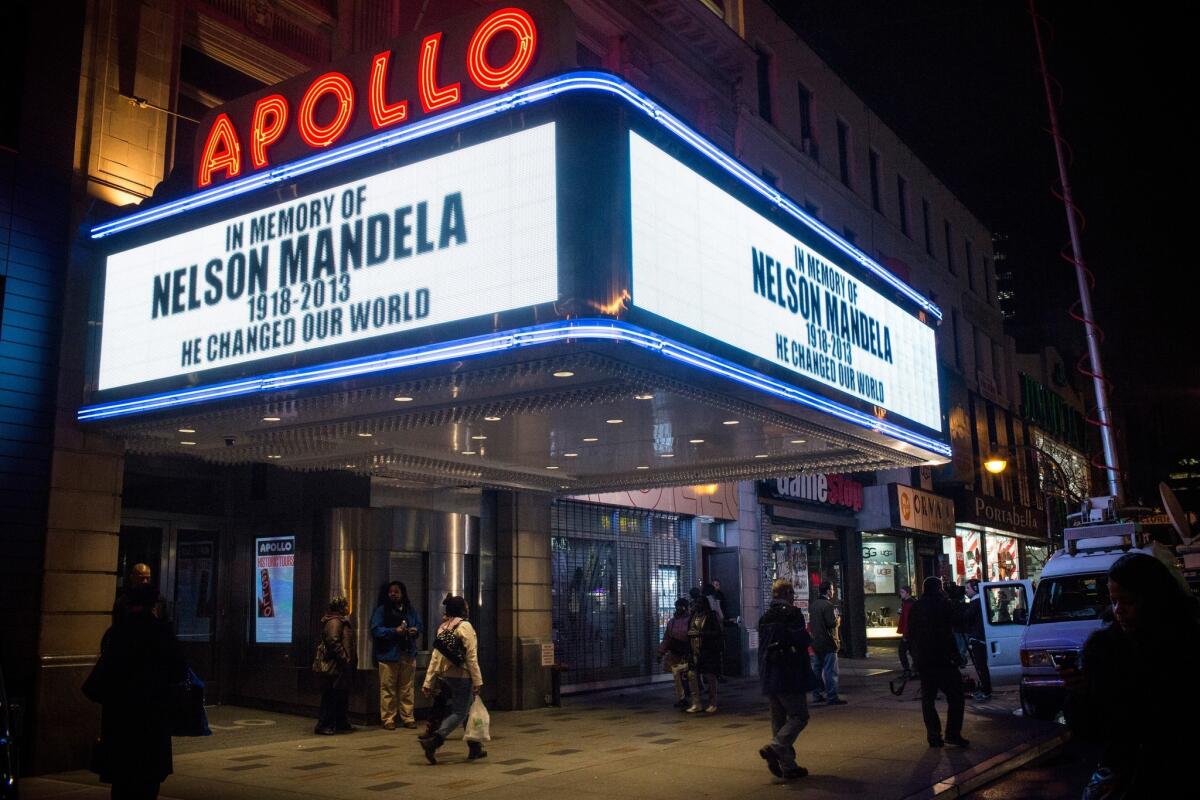Beyond Nelson Mandela: Rights picture brighter in much of the world

The death of revered South African freedom fighter Nelson Mandela has spurred reflection on the global state of human rights in the years since his transformation from political prisoner to president and elder statesman.
Those striving to build on Mandelaâs vision of equality and mutual respect see a world that is profoundly more free, fair and accountable than the one that existed when he walked out of prison in 1990 to wage the final battle in the war on apartheid.
Human rights horror stories persist in many places around the world, most disturbingly in Syria, where nearly three years of civil war have left more than 100,000 dead and devastated the home life and livelihoods of millions. Even countries like Myanmar, where military dictatorship has given way in the past few years to pluralism and social reform, the progress has been uneven, rights advocates say.
PHOTOS: Nelson Mandela through the years
But Mandelaâs inspiring leadership of South Africa from institutionalized racism to one of the continentâs most prosperous and established democracies has coincided with the end of authoritarian rule in Eastern Europe, worldwide growth in the number and clout of human rights groups and dramatic technological advances that prevent despots from doing their worst without the outside worldâs notice.
âThere are 500,000 videos on YouTube from the Syrian conflict. We now find out in minutes what is going on in different parts of the world,â said Iain Levine, deputy executive program director for Human Rights Watch.
He pointed out that as he spoke, a colleague was live-blogging from Central African Republic, where United Nations peacekeepers have been deployed to quell Muslim-Christian fighting in the impoverished and restive state.
With cell phones in the hands of people in even the poorest countries, images of abuses are instantly flashed around the world via Twitter, Facebook, text messages and shared photos, Levine said.
The availability of documented evidence accelerates the international communityâs ability to bring pressure on perpetrators or get global bodies, like the United Nations, deployed to prevent or at least identify abuses, he said.
FULL COVERAGE: Anti-apartheid icon Nelson Mandela dies
Success in defeating injustice also has an infectious quality that puts dictators on notice that their power to repress may not be endless, Levine said. He pointed to the Arab Spring uprisings that deposed longtime leaders in Tunisia, Egypt and Yemen as having inspired nascent opposition movements even seemingly unreformable nations like Zimbabwe.
Angola, Somalia and Sudan remain largely impervious to the encroachment of democratic values and respect for human rights, analysts say. But the rise of South Africa and other nations from racism, colonial repression, civil war and dictatorship has helped foster what are seen as moves in the right direction.
In the annual Corruption Perceptions Index for this year, prepared by Berlinâs Transparency International, African states still mostly brought up the rear of the 177 countries ranked. But notable exceptions like Botswana, Cape Verde, Mauritius, Rwanda, Lesotho and Mozambique have been making steady progress in cleaning up government and law enforcement, the 2013 index shows.
Nevertheless, setbacks bedevil even the most meager improvements.
Just last month, word emerged from Afghan legal circles, where a new penal code is being drafted, that some Islamic fundamentalists want to see stoning and flogging brought back as punishment of moral offenses.
PHOTOS: The world reacts to Nelson Mandelaâs death
âStoning and amputation are always torture, and so is flogging as practiced in Afghanistan,â warned Horia Mosadiq, Afghanistan researcher at Amnesty International. âAll these forms of punishment are strictly prohibited under international human rights treaties, which are binding on Afghanistan.â
Amnesty also posted a list this week of cases of concern for the state of human rights in 12 countries, including Nigeria and Ethiopia, for jailing dissidents and forcibly evicting more than a million people over the past five years. The report also cited abuses in Belarus, Russia and Turkey in Europe; in Bahrain, Tunisia and Israeli-occupied Palestinian territory in the Middle East; in Myanmar and Cambodia in Asia; and Mexico and Honduras in Latin America.
Myanmar, also known as Burma from its colonial era, has witnessed notable advances in respect for human rights over the past three years with the rise to power of President Sein Thein and his ending of house arrest for opposition leader and Nobel Peace laureate Aung San Suu Kyi.
Since Sein distanced himself from the military dictatorship in March 2011, opposition activists have won seats in parliament, and political and economic reforms have widened. The country is still taken to task by rights advocates, however, for continuing to jail political prisoners and for mistreatment of ethnic and religious minorities, in particular the stateless Rohingya Muslims.
U.S. rights groups have credited Mandela with having âinspired us to be our best selvesâ in working toward economic equality and fighting injustice.
âAlthough it seems unthinkable to imagine a world without Nelson Mandela, we must,â said Anthony D. Romero, executive director of the American Civil Liberties Union. âOur dedication to protecting freedoms for everyone â no matter what their race, gender, religion or whom they choose to love â is the precious legacy he has passed on to us.â
Much work remains to be done, as State University of New York-Albany history professor Ryan Irwin observes in his essay on âMandelaâs Unfinished Business,â published Friday on Foreign Affairs magazineâs website.
Although Mandelaâs vision of a free and democratic South Africa inspired civil rights champions across Africa and the world, it also raised expectations in a country that for all of its successes âremains plagued by pervasive income inequality, structural unemployment and widespread poverty.â
Those unrealized expectations are being presented by Mandelaâs political allies as marching orders left by their departed general.
âThe large African baobab, who loved Africa as much as he loved South Africa, has fallen,â the ruling African National Congress said in a statement after Mandelaâs death, comparing him to the continentâs sturdy tree of life. âIts trunk and seeds will nourish the earth for decades to come.â
ALSO:South Africa struggles to live up to Nelson Mandelaâs legacy
Nelson Mandela dies: Watch his 1st TV interview, prison release, more
Memories of Mandela and the country he loved from a Times correspondent
A foreign correspondent for 25 years, Carol J. Williams traveled to and reported from more than 80 countries in Europe, Asia, the Middle East and Latin America.<runtime:include slug=âla-na-nn-carol-j-williams-sig-20121113â /
More to Read
Sign up for Essential California
The most important California stories and recommendations in your inbox every morning.
You may occasionally receive promotional content from the Los Angeles Times.











